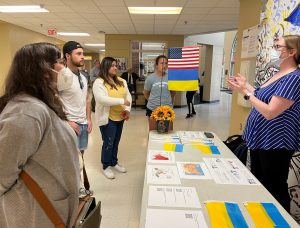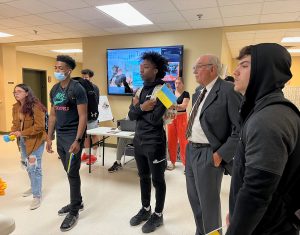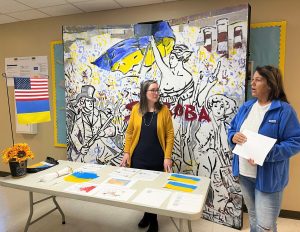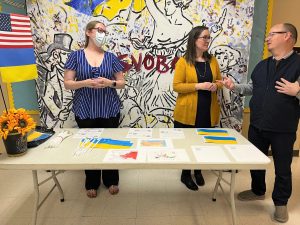GREENEVILLE – With the conflict in Ukraine now a month old, faculty members in the College of Civic and Liberal Arts at Tusculum University dispensed helpful information that put the matter into context for students, fellow instructors and staff members.

Mikaela Cooney, right, speaks to students during the presentation about the conflict in Ukraine.
Dr. Mary Cooper, associate professor of political science, and Mikaela Cooney, assistant professor of criminal justice, explained the situation to those who visited their table in the Scott M. Niswonger Commons Thursday, March 24. They made a variety of handouts and Ukrainian flags available to anyone who wanted them.
Joining Dr. Cooper and Cooney briefly was Jody Bryant, an adjunct instructor of history, who provided additional details about the conflict.
“As a university with a mission grounded in civic engagement and a civic arts focus to education, we want to ensure people on campus and in the community are well informed about events taking place locally and globally,” said Wayne Thomas, dean of the College of Civic and Liberal Arts. “Our faculty members have extensive knowledge that will enable others to have a more complete understanding of what is at stake in Ukraine.”
Dr. Cooper and Cooney shared background about European political developments since World War II, particularly after the fall of the Soviet Union. In explaining that one of the motivations for Russia to invade Ukraine was to reclaim former Soviet republics that had broken away, the professors provided details about the North Atlantic Treaty Organization. Dr. Cooper said NATO was the western alliance that opposed the Soviet Union and the Warsaw Pact, and she noted its growth with the addition of Central European countries and even former Soviet republics.

Students and a Tusculum Board of Trustees member listen during the presentation.

Jody Bryant, right speaks during the presentation.
“Vladimir Putin is using nationalism, this argument that he can regain the lost glory of the Soviet Union to maintain domestic support, as a basis for his actions,” said Dr. Cooper, who has a doctorate in political science from Yale University. “He perceived incorrectly weakness and disunity among the NATO alliance, but we have seen a lot of unity and resistance from individuals and countries that are helping Ukraine as much as possible without triggering a broader war.”
Dr. Cooper and Cooney presented information about international law and war, including the United Nations’ charter and the Geneva Conventions. The professors also provided news stories from a variety of outlets about the conflict and ways people can help Ukraine.

Left to right, Mikaela Cooney, Dr. Mary Cooper and Wayne Thomas speak during a break in the presentation.
Dr. Cooper said she and Cooney want students to understand how the conflict in Ukraine fits into the broader political and historical landscape. She said they conveyed how the Ukraine situation compares with previous international conflicts and why Russia’s actions are shocking so many people. They also wanted their audience to understand why people are worried about the ramifications if Putin succeeds in Ukraine.
Cooney said the information presented Thursday is helpful for her students. One of her classes discusses different types of force and targets, and she hopes the situation in Ukraine will spur further conversations about legal and illegal uses of force.


